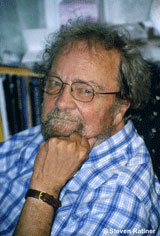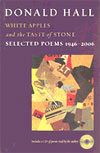Welcome to The Writer's Almanac Bookshelf, where you'll find highlighted interviews of poets heard on the show.
Donald Hall

Photo: Steven Ratiner
Edgar Allan Poe influenced me when I was twelve-years-old and morbidly attracted to horror movies. The boy next door told me I ought to read Poe, and so my first poems imitated him. It didn't last long. When I was fourteen I discovered modern poetry, and it was then that I decided I wanted to be a poet the rest of my life.
I still read and reread a lot of the seventeenth century, especially Donne and Marvell—but I love poets all over the place, including the great ancestors Whitman and Dickinson, and the superb poetry of Thomas Hardy.

White Apples and the Taste of Stone
(Buy Now)
(books by this author)
"Even if you've been reading Donald Hall for years and years, it's good to see the old poems in new type, newly arranged, like hearing your favorite recording of Bach again but this time in a car driving up the coast of California. He's pretty magnificent—Hall, that is, though Bach is too—and this book is a generous helping of a great poet, though you should buy his masterpiece One Day in its entirety. And also The Old Life."
–Garrison Keillor
It was exhausting, going through sixty years of poetry to make choices for White Apples and the Taste of Stone. I made a big manuscript, mostly scissors and paste, and sent it to four friends who were willing to undergo more than four hundred pages of poetry. At the same time as I sent them the manuscript, I sent them a list of poems from my published books that I was omitting. They were able to tell me not only which poems I should not print, but which omitted poems I should add back into the manuscript. Everybody gives different advice, and I got a lot of help from my friends.
Q: Your book includes a CD of poems read by you. Would you prefer to read or hear your favorite poems?
Whenever I admire a poet, I enjoy hearing him or her read the poems aloud. Some good poets read badly, but I like to hear them anyway. Whenever I read a poem, whether I know the author or not, I always hear it in my head—in my own voice. I read the poems as if I were reading music.
Q: Are you working on any projects we can watch for in the future?
I'm working on a book that brings together some of my prose about this place where I live, a paperback called Eagle Pond. I am crossing out repetitions and adding essays, which I had never before collected into such a book. I'm also working on further memoir, parts of my life that I have never written about. As always, I am working on new poems.
Donald Hall is a member of the American Academy of Arts and Letters and the author of fiction, essays, children's literature and sixteen collections of poetry, most recently White Apples and the Taste of Stone (2006). Hall lives in Wilmot, New Hampshire and is the Poet Laureate of the United States.